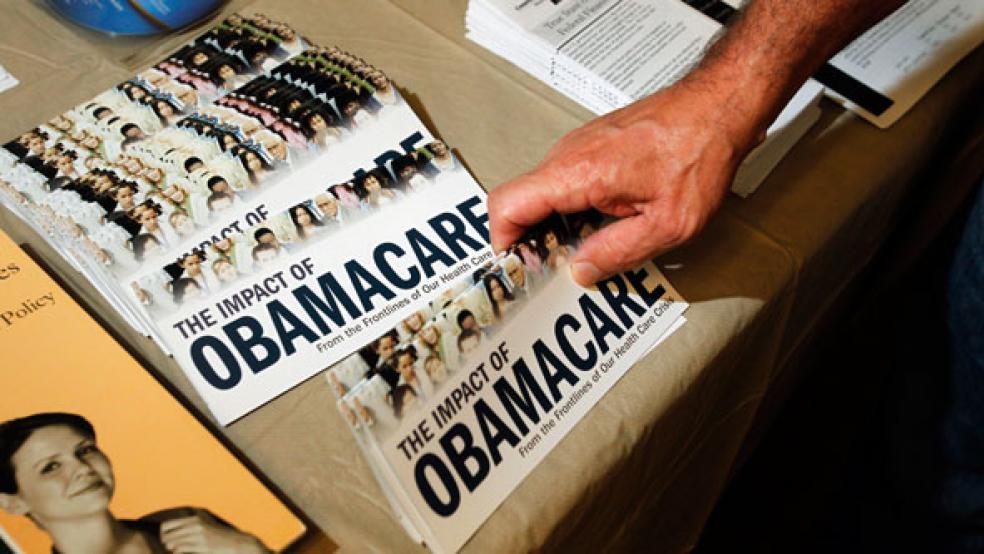Don’t look now, but Marco Rubio is taking down Obamacare. Unhappily for him, the process by which the GOP presidential candidate is undermining the healthcare law does not lend itself to soundbites and easy campaign slogans. But, the damage Rubio is inflicting on President Obama’s program is nonetheless severe – possibly fatal.
Republican backers for some time have griped that Congress has failed to do away with the unpopular program. Efforts to defund Obamacare and numerous votes to repeal it have come up short. What Rubio is doing, though, exposes the underlying flaws in the healthcare program. At the end of the day, Obamacare was sold to Americans as a way to “bend the cost curve” on spiraling healthcare costs, rather than as the giant entitlement program it actually is.
Related: Obamacare Is Now on Life Support
Upon adopting the bill, the White House shielded the public from the unpleasant realities of Obamacare in several ways in order to sell it to the public and not upset the president’s shot at reelection. Among those realities were unpopular taxes, like the Cadillac tax, slated to take effect in 2018, which were meant to pay for the bill.
Another cost was hidden in the name of “risk corridors.”
Insurance companies signed up to participate in Obamacare eager for new customers, but uncertain about the profitability of the new initiative. After all, they were required to provide coverage to customers with pre-existing conditions, and to comply with many new mandates; also, they did not know who might sign up. The president portrayed Obamacare as an opportunity for young, healthy people to receive insurance coverage, and pitched his appeal to that end. Unhappily, as a clearer-eyed assessment might have predicted, it was mainly the old and the sick who signed on.
Many insurers lost money participating in Obamacare, but they were protected in part by the so-called “risk corridors” established under the bill. In effect, if the program proved unprofitable for a given company, the “risk corridor” guaranteed the government would step in to make them whole. Monies to do so would come from companies that had managed to make a profit, and from taxpayers.
Related: Obamacare’s Bait and Switch Has Left Consumers Scrambling in 2016
The industry in fact lost money – to a far greater degree than anyone expected. In the first year, insurers were so underwater that they requested a bail-out from the government of $2.87 billion. The industry money available to compensate losing insurers amounted to only $362 million. Marco Rubio stepped in to make sure that taxpayers were not on the hook for the missing $2.5 billion. He introduced a provision in last year’s spending bill that would limit the funds available to compensate insurers, by prohibiting the use of Medicare and Social Security Trust Fund money for that purpose.
Now, Rubio and others in Congress are attempting to make sure those restrictions live on in this year’s $1.1 trillion Omnibus spending bill. Democrats are incensed, because Obamacare survives only if the insurance industry participates. Companies will not do so unless they can turn a profit. Their opportunity to do so will either come from increased taxpayer monies or from charging higher premiums for coverage. There’s the rub.
Democrats are already alarmed by the rate hikes posted by many insurers across the nation, which has emboldened critics of the healthcare bill. Consumer see costs going up, while at the same time they are confronting higher deductibles and narrower choices of healthcare providers. The bottom line, Obamacare is still unpopular, with 50 percent opposing the bill and only 43 percent approving of it – a real problem for likely Democrat nominee Hillary Clinton in 2016.
Related: Obamacare Enrollees Are Reeling from High Deductibles
The Obama administration was apparently caught off guard (a phrase describing their reaction to more and more events here and abroad) by the shortfall in monies available to meet the losses by insurers. Just a few months ago the head of the federal marketplace assured state officials (as reported by The New York Times) that there was plenty of money to cover losses. The White House has promised the needed funds would flow from collections this year and next. However, that optimism was doused by a report published earlier this year by Standard & Poor’s, which claims the monies will fall short and that numerous companies could suffer serious financial losses.
The bottom line is that the Obama administration’s efforts to mask the financial realities of Obamacare are unraveling – just in time for the 2016 election. Providing free healthcare to millions of Americans has a cost, which is being borne by taxpayers and by those whose insurance coverage has become more expensive and less generous. It will not be borne by insurance companies. The shortcomings of Obamacare will continue to motivate voters, just as in 2014.
Voters may decide they like the healthcare program, and are willing to make sacrifices to support it. Americans may agree that universal healthcare is a valid goal. But, President Obama’s ongoing dishonesty about the healthcare bill, and the efforts to mask the real costs of the program should be exposed. Only through a realistic assessment of the program will our legislators know how to fix what is broken.
Rubio’s early intervention in exposing the government’s bailout of insurers and preventing taxpayer money from plugging the gap should result in a boost in the polls.






